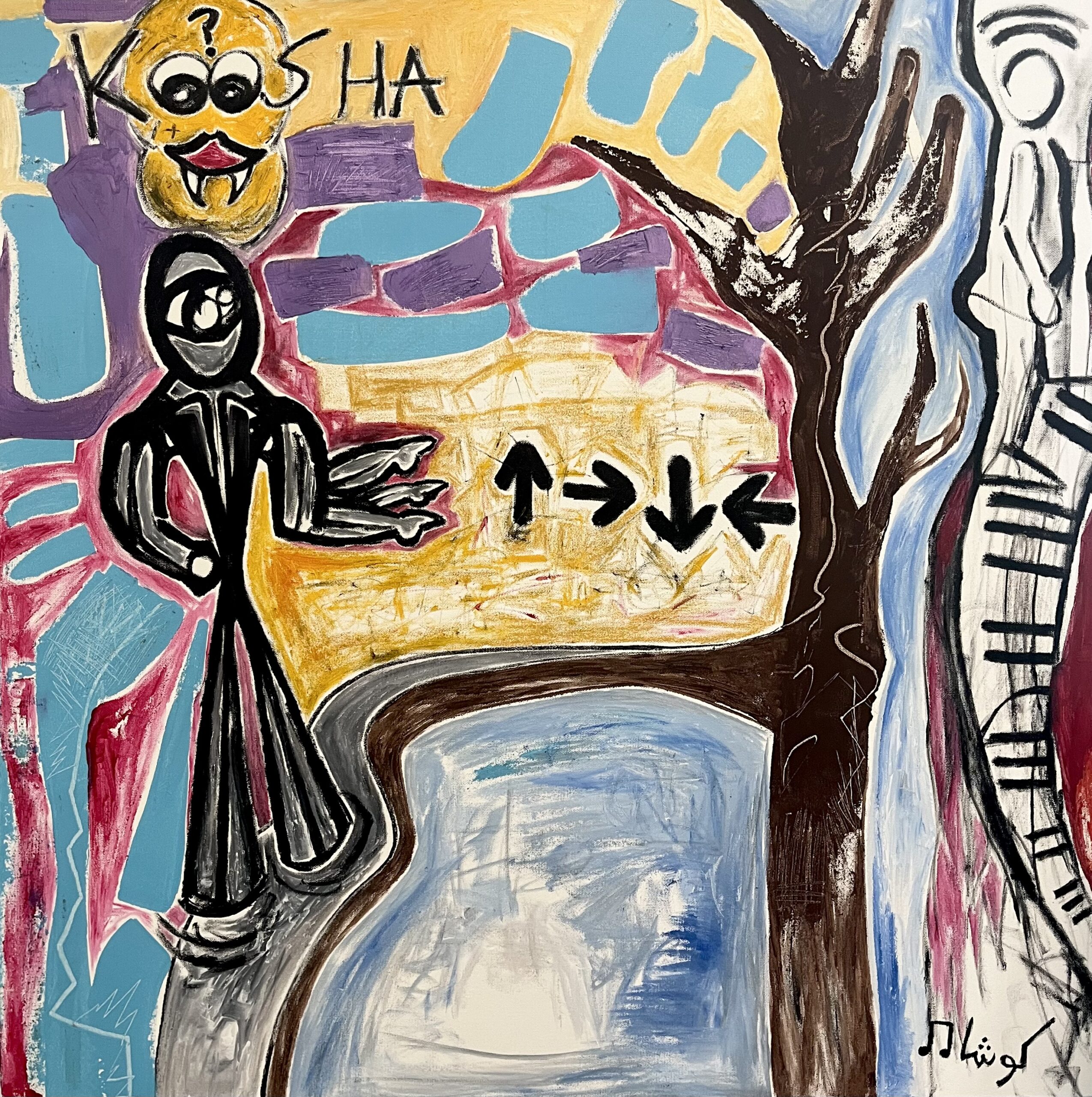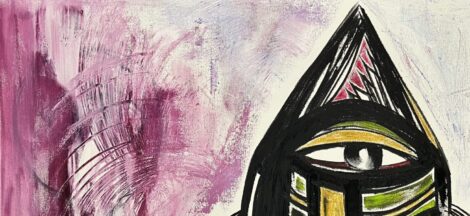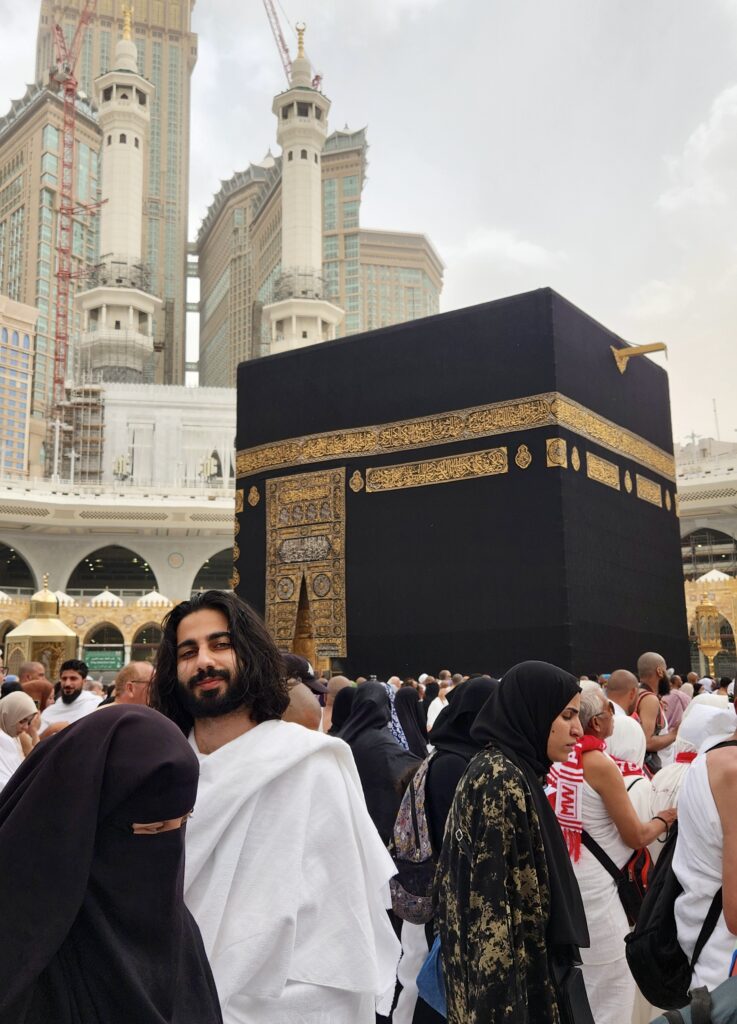
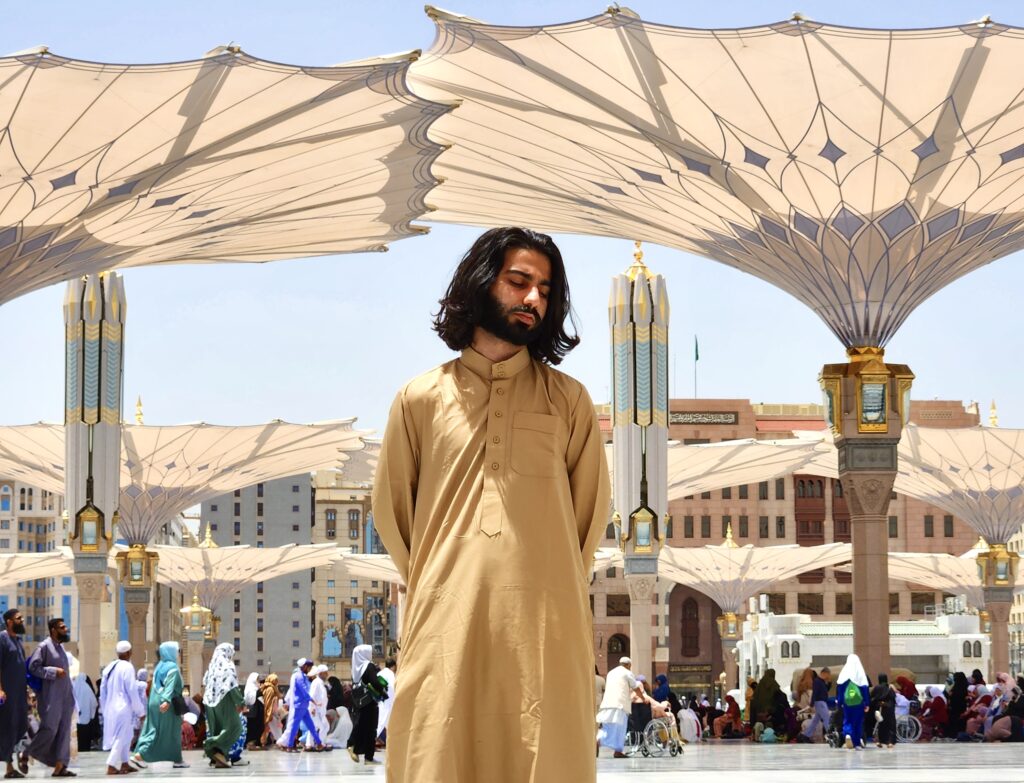
This is my perspective as a 21-year-old Iranian American who grew up in the San Francisco Bay Area, where I had limited exposure to Islam. My takeaways are not meant to convey whether I believe in Islam or critique its place in today’s world; rather, I offer an optimistic stream of consciousness that captures the pilgrimage experience and how it moved me as an individual.
After completing Umrah, I recorded two voice memos on my phone right before drifting off to sleep, reflecting on my Saudi experience. I recommend listening to this audio to understand my pure thoughts without the filters that come about when writing or creating art. The following recordings are unedited and capture a personal and vulnerable stance on my experiences in both Madinah and Makkah.
Hit the three dots next to the speaker icon to adjust the playback speed. I recommend listening to these at 1.25x speed.
Transcript of Part 1
Okay, it’s April 29th, a very hot Monday in Mecca.
I’m sitting in a hotel room on the 26th floor, and today I completed Umrah for the first time, which was very interesting and fascinating.
Here I am talking about it.
This past week I’ve spent a few days in Saudi Arabia between Medina and Mecca.
I began my journey in Medina.
I spent a few days praying in the Al-Nabawi Masjid, where I got to pray in congregation during set prayer times as well as asynchronously with my friend Haider and our host Khalid, who has been living in Medina for the past two months and is a very devout Muslim.
We went to Al-Nabawi every day as a routine.
Much of the religious and spiritual life in Medina revolves around this Masjid.
The structure looks like something out of a science fiction movie.
It’s incredible and reminds me of Star Wars.
The people are in a variety of clothing.
The women are covered but in very diverse and interesting ways.
There are many colors and different types of covering.
Some women show their faces, others just their eyes, and some are fully covered in burkas.
The men, on the other hand, have a wider range of expression granted by their clothing, and I found that very interesting.
It’s apparent that there are people from all over the world in Medina and Mecca.
You see different color turbans, Saudi clothes, and more Punjabi flavors—there’s a bit of everything.
When you see a bunch of people aligned under one vision, one act, it can be inspiring.
We often focus on differences, but when a faith gives you instructions and you follow those instructions, and there are hundreds of thousands of people in the same space following them, the result is fascinating to witness.
As someone with not much of a Muslim practicing background, but an ethnic Iranian background, this was always a question: What are the benefits of this practice?
Growing up in the States, I was exposed to a lot of Islamophobia in the post-9/11 world.
There are stereotypes about Middle Eastern and Eastern cultures, putting them into boxes, calling people terrorists, and blaming the religion for various issues.
Is it the religion? Is it the people? Is it the mix? Is it when religion meets the state?
Are the regimes the ones hindering the perception of the religion?
These questions were on my mind going into the Saudi experience.
I’m coming out of it with a much clearer understanding of what Islam is in practice and how it benefits its followers.
Every time I knelt down to pray, I wasn’t certain what I was doing.
Given that I don’t speak Arabic and haven’t read the Quran in full, I just prayed in English.
I used these moments as a time for brief meditation, focusing on the present rather than the past or the future.
I was very present in Al-Nabawi and around the Kaaba.
Islam this week, and I suppose at any time for its followers, allows a person to be present through practice, which I find very valuable.
My mind is always busy—I would say I’m a restless person.
This past week was almost therapeutic.
The sun was beating down on me, so much of my focus went to survival instincts.
Given that I had to pray outside and sometimes out of the shade, it was difficult.
I would get dizzy and dehydrated, but I just focused on the present, and I prayed.
I prayed for family, friends, past lovers, future lovers, and distant relatives.
I tried my best to spread positivity and an abundance of good faith.
I think I did a good job, and I hadn’t really done it before, which made this moment particularly special for me.
Thinking about Mecca, it was very interesting.
Seven rotations, called Tawaf.
I saw so many people passionate about their religion, about the Kaaba, about what it symbolized, about God, Allah.
It’s always interesting to see people passionate about something, especially when there are thousands of different faces, beard colors, and languages.
There were groups of people from different countries—Algeria, Turkey, Malaysia—and you could see the flags on their clothing, almost like a school field trip.
I almost draw analogies between this Umrah experience and completing a raid in the video game Destiny.
There are steps you have to take within the structure and around the Kaaba that reflect what I’ve done in video games.
I mention video games because they present something unreal, abstract, and this was an abstract experience for me.
The stimuli were abstract, but what I take from it is not.
It’s the realization that people can be on the same page and believe in the same thing.
There’s a lot of peace that comes from that.
Saudi is peaceful. Mecca is peaceful. Medina is peaceful.
I was paranoid at first because, when I left London for Saudi, I wasn’t at my best mentally.
But the more time I spent coming in and out of the masjid and visiting the place where Muhammad allegedly began Islam, all these experiences led to a newfound respect for unity and a shared vision of the world.
I’m not going to say that Islam is perfect in its teachings.
I don’t think anything is perfect, but I do believe there is a method to it.
It’s not madness; it’s a clear, disciplined method.
It’s a method that many people can follow for a long time.
I’m not a follower, but this week I was, and I benefited from it.
I think when you’re judging a religion or a set of ideologies, you shouldn’t focus on whether every part is truthful.
You should ask whether it benefits your life.
So many things in our lives are constructs, abstractions of truth, or systems we’ve built to understand other things.
At the end of the day, you should judge something by its value and utility.
The utility of Islam, from what I’ve experienced in Saudi, is that it brings peace, discipline, and structure to life.
For people like me, who are restless and always thinking, that structure is valuable.
By praying in front of the Kaaba or outside in the Mecca structure, it’s time devoted to something beyond myself, and I think that’s important.
This concept could be applied outside of Islam, but Islam has provided a way for over 2 billion people to feel this sense of peace and purpose.
For that, I’m thankful.
I’m glad I’ve experienced this.
Medina and Mecca have been very special.
I’ve learned more about myself.
I’ve been very present, which I haven’t been in a long time.
This week I finally came to my senses and sobered up, if you will.
I’m looking forward to seeing where life goes from here.
I prayed for a lot of things.
I’m working very hard on my music and on getting other pieces of my career and life together.
It all comes down to where I put my energy, how disciplined I am, and how I let myself be used in this world.
Let’s see where we go.
Inshallah, things go well.
Thank you for listening. Peace.
Transcript of Part 2
And I want to touch on the atmosphere of these spaces because I think the atmosphere or the energy is important to the person.
We are vessels.
We have our own energy, and a space has this energy that we push and pull with.
I think that in Medina, I felt a more organized and intense environment.
An endless array of people are just on their knees praying within the masjid, outside the masjid, and in other masjids.
It feels like that city is something distinct.
On paper, it’s number two to Mecca in its holiness within the Islamic world, but when I was there, I felt a very distinct flavor of the religion.
I felt that the people were very intense about their practice.
In Mecca, I also felt some intensity.
I felt that it was important.
I felt that the Kaaba was the prime symbol of the religion going into the whole Umrah experience, but this is something I knew.
This is something that everyone who knows of Islam knows.
The black box, or whatever that thing is, is the symbol of Islam. It’s got to be important.
When you’re there, you do feel it.
People are fighting, trampling over each other to touch the meteorite, which is on one of the corners, just to even touch the Kaaba.
There’s a huge rush.
The atmosphere has a bit of rush, this agitation, this feeling that people have been waiting their whole lives to experience this.
Their faith and their relationship with their creator are bound to this experience.
There’s a relationship there.
Obviously, given my lack of past experience, I don’t feel it as much.
The religious and spiritual aspects are not as felt within me, but as a spectator, I can see that.
Mecca brings a sort of raw, animalistic version of people when they’re circling the Kaaba.
As they approach the square, they want to touch it. They need to connect. They have to. It’s their duty.
Yet in Medina, I still felt there was even more organization and a more directed energy towards that box.
Now that I’m discussing it, it’s hard to compare the two cities and the energy felt.
But my takeaway is that you might think Mecca is the hub of this Islamic energy, but I feel like Medina showed more of that for me.
I think it’s subjective, but Medina has many sites, many masjids with really rich history.
Different places where the Prophet stayed, built, worshiped, and developed the religion.
Mecca just feels like the hub, almost like a shared social space.
I’m just grateful to have been in these spaces and to try to piece together what I feel about it.
I never saw this coming, but I’m grateful.
I’m thankful, and I hope there are other places with such singular, distinct ways of being.
Background
This past year, I had the privilege of performing Umrah alongside a close Muslim friend of mine, Haider. In March, I began entertaining a trip to Saudi Arabia as I sat in my cold London dorm room. By April, I had my pal convinced to join me on this great adventure. His family back in Pakistan were eager to see their son perform the holy pilgrimage that they had done many years back.
Makka (Mecca) was a recurring theme in my childhood. Iranians throw around the term ‘Hajji’ when describing individuals, often elders or devout Muslims, who have performed Hajj. So the concept of being a Hajji was not new, despite my lack of connection to Islamic teachings or practices. Regardless, I understood that a great part of my family in Iran practiced the religion and perceived Makka as a source of unity and the divine. Islam and Iran were always two distinct concepts that crossed over culturally. At times, I did not want to be put in the “Muslim” bucket; I had to give Western friends a rundown of Iranian (Persian) history to explain the differences and overlaps between my national heritage and its religious implications.
It wasn’t until college that I began understanding the core message of Islam and seeing its practice among a diverse body of students at Minerva and in strangers praying across different cities I dwelled in. I was as curious as I am about any ideological force that has tangible outcomes. As a child, I would pick at logical fallacies I thought existed in the religion. I thought I knew better than to follow something outdated and inapplicable to my post-modernist worldviews. But now, I was much older and felt a pull from Saudi Arabia. It felt like the right time for this journey to materialize; my anthropological faculties were prepared to inhale the desert air and absorb the spiritual stimuli that awaited me. I gravitated to Makka because of the people, the unity of minds, and the sacred architecture of its mosques. I had little knowledge of Madinah, though its Al Masjid an Nabawi became an important pillar of my trip. I was struggling mentally in London’s frigid atmosphere and needed an extreme change of scenery.
Now also felt like the right time because of the ongoing global conflicts which brought a heightened presence of Islam on my social media feeds and in conversations with peers. I was curious to understand the underlying norms that brought billions of people together, especially in times of great suffering. I went to Saudi with no expectations, but with an open heart and mind, eager to experience something new. I am grateful for this decision and continue to carry the vivid memories of my time there.
Message to the people
I recommend forming opinions and worldviews based on critical thinking and having real skin in the game, especially if your privilege grants you greater agency to travel. It is too convenient to make assumptions about a land, its people, and its fundamental beliefs from afar. Our only hope for lasting peace and coexistence is true empathy. Understanding how ideologies form and exercise their power today allows us to better understand the individuals who practice them. This experience has helped me understand Muslims and empathize with their collective struggles and triumphs.
I now feel more comfortable, even excited, to engage with people who practice Islam, as I have gained insight into a core part of their being that cannot be conveyed through media or casual conversation. By immersing myself in the atmosphere of religious sites and participating in congregations, I began to quiet my judgments and humble myself before a greater force. I believe this power dynamic is essential for humanity to overcome corrosive egos and embrace a shared optimism for the future, guided by forces we cannot control but should respect.
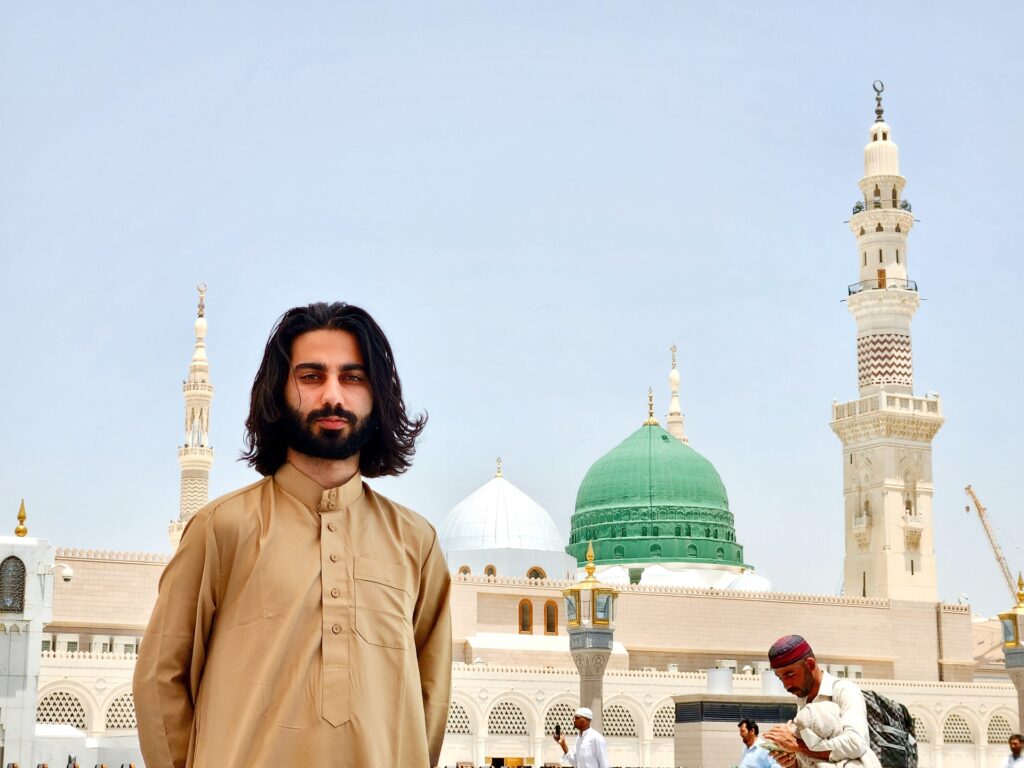
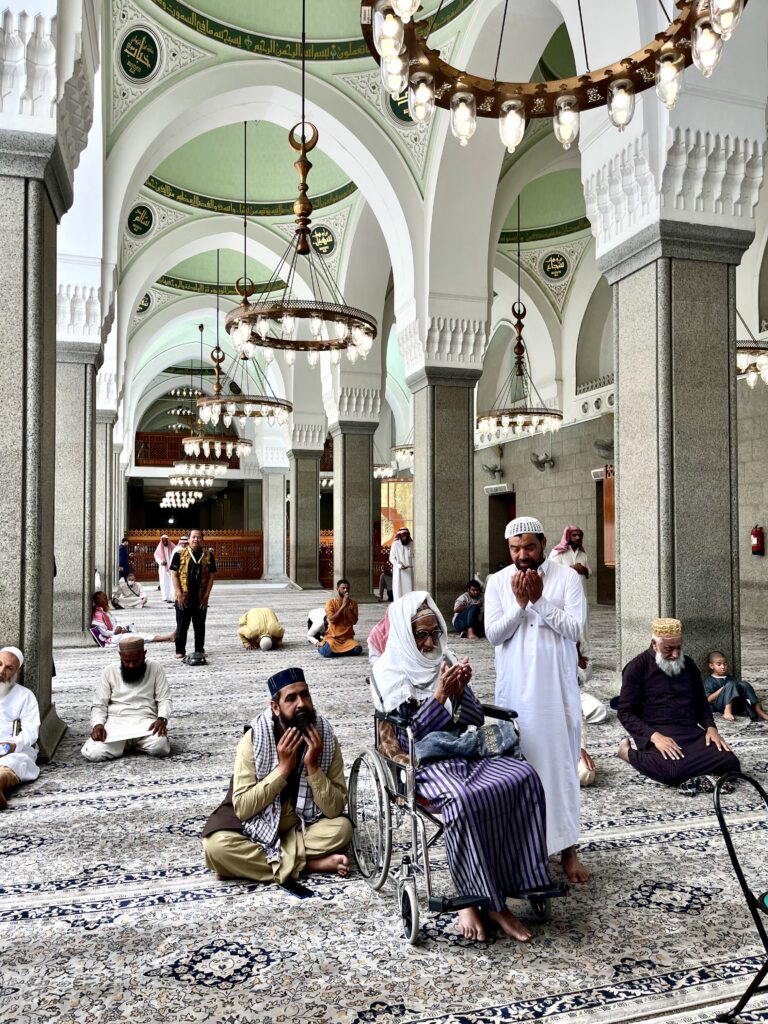
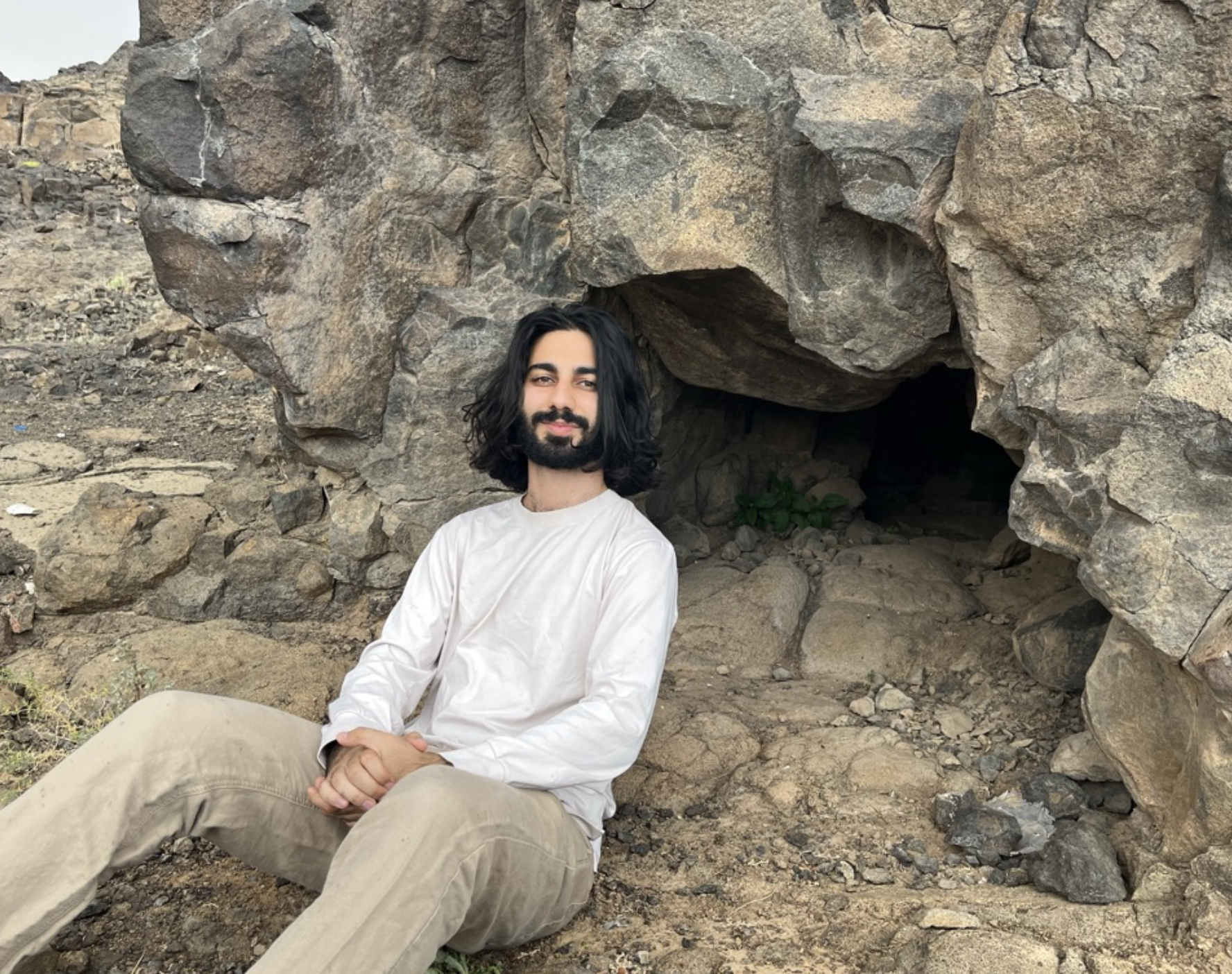
Stay updated with future works.
